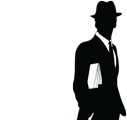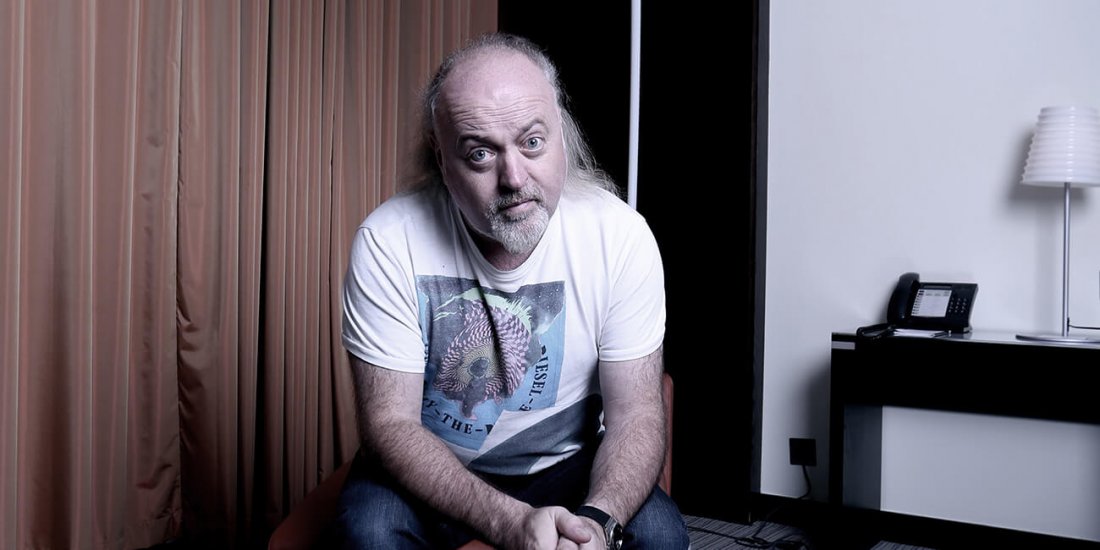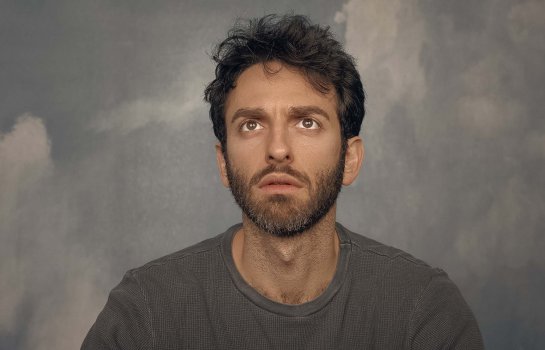Bill Bailey, comedian, Larks in Transit
You don’t have to hold on and obsess over things too much – keep your backpack light and keep moving ...
Some milestones are more worth celebrating than others. Let’s face it, your three-month mark of keeping your desk cactus alive might be great for you, but your co-workers don’t care. If you are celebrating the 20-year mark of first coming to Australia to tour your acclaimed brand stand-up comedy then yes, it’s a good reason to celebrate. Bill Bailey isn’t one to make a big deal out of these sorts of milestones, but it is a remarkable testament to his comedic ingenuity that he’s not only been able to perform around the world for more than twenty years, but to do so while at the top of game for nearly the entire time. To mark the occasion, Bill Bailey is coming back to Australia with a new show in tow. Larks in Transit is a show about the trials and tribulations of being a travelling comic, relaying stories from countries he has visited through joke and song. Ahead of his performances at QPAC on November 22–25, we caught up with Bill to talk nightmare travel stories and how his shows evolve from tour to tour.
Let’s start with your show, Larks in Transit! I read that it’s a compendium of tales about your travels around the world. Are there any countries that you’ve encountered more bizarre experiences in than others?
Yeah, I think that travels in Indonesia are usually pretty interesting! It’s a country which is huge, with an enormous population and enormous diversity of languages and cultures. It has got some creaking infrastructure too – more often enough stuff just breaks down and stops. I’ve had some interesting experiences there of planes that don’t fly, planes that can’t land and plans that take off early. That’s a real pain! I show up to be told that it’s left. The pilot had to get to a wedding or something so he had to leave early. So, I’ve had some scrapes there. I’ve had issues in parts of Britain as well – if you’ve ever tried to travel around parts of Britain on the train then you’ll know all about the experience!
In terms of travelling mishaps – aside from pilots leaving early – what’s one that you can remember that really stuck with you?
We were on an island in Indonesia for two weeks waiting to leave and in the end we finally ended up getting a military craft – a naval medevac plane – to pick us up. That was really interesting, there was a civil war going on in Indonesia at the time, so it was a bit hairy as well. There was a real tension in the air and it turned into a three-year bloodletting between Christians and Muslims not long after, which is very depressing, really. For us it was like the last chopper out of ‘Nam – there was fighting at the airport, fighting in the streets and here’s us going, “Have you got a window seat?”
For the show, how far back into your career and travels do you draw your stories from?
I think that the 20-year mark of coming to Australia is a good starting point. What I like to do these days is use those sorts of things as a kicking off point. For every show you need to find a good place to start and that occurred to me – it’s quite good to acknowledge these milestones. The show is about touring as a comic and my experiences and the kind of places it gets you. There’s also things that have a happened along the way, not just to me but events that have occurred, and that all ties in to the traditional elements of my show. I talk a bit about politics and a lot of music is in the show as well. This show has a lot of audience participation – I always love to have a chat with the crowd as it always makes things more interesting for me – and in this particular show I have a bit of tech where I sample the audience and the sounds of them singing and making the noise of a band. There’s an experimental element as well. It’s got every type of comedy! I hadn’t really realised but I did a show in London about a year ago and one of the comments I got was that the show had all different kinds of comedy. There’s some observational things, some surreal stuff, music hall, old vaudeville – I probably I still haven’t figured out which direction I should go in yet!
Understandably each show you make is a different beast, but when you get comments like that back about a show and it’s really positive, is it hard to put that show on the shelf and start from scratch?
Well, what happens is that shows naturally kind of evolve and they morph into another one before your eyes. You’re doing a routine and for whatever reason you think you are done with a bit, and then something else occurs to you and it takes on a life of itself. Perhaps something happens politically or to you personally and that dominates the show and things naturally get pushed out. I did a show last night in Bratislava in Slovakia and the show is quite different to when it started. Stuff has gone, I’ve chucked stuff out, new ideas have come in and that’s just the way it is. It’s not quite the same as ‘finishing’ a show and getting rid of it. By the time you get to the next one, the old show has shed a lot, or parts have become irrelevant. I have a really short attention span – I do something for a bit then I get bored with it and want to go do something else. The show is in a constant state of flux.
Because you travel so much, are you quite good now at improvising on the fly and adapting your show to foreign audiences?
I think that people that go and see comedy are already the kind of people who are sympathetic to what you are doing. But also comedy has become very universal – people are a lot more comedy savvy now and my experience of the last few years is that Europe is a huge market for British comedy. It probably wasn’t that way ten years ago – we now have a younger population in Europe that speak English, they’ve watched British comedy on YouTube and there’s now an appetite for it. The show doesn’t change a huge amount – obviously if there is some major political event happening in the country, it’s like the elephant in the room – you have to talk about it.
Your brand of comedy is quite unique with the inclusion of musical performance – one would think that crafting those bits must require a lot more work than conventional stand-up comedy. What’s the difference in your approach between those styles?
Well, stand-up comedy in general is based on something you feel strongly about and you are articulating it in a comedic way. That takes a while to take shape – it’s like a constantly moving thing. The musical sections have to arrive fully formed, really. There’s a lot of prep that goes into that – they are the set pieces of the show. They are the fixed points, in a way. I rehearse a lot at home in the studio and spend a lot of time getting it right, so yes – between those sections are bits that are more fluid and can be improvised but the music sections are the polished bits, or pillars, of the show.
A musician would spend a lot of time tinkering with songs before being satisfied enough to put them on an album. For you personally, when is a song or musical segment good enough to put in a show?
I think it’s a lot of trying out that helps. I get a vague idea when you’ve tried it out a couple of times and you get the same reaction. You think, “Okay, we’re getting somewhere.” Once the basics are done it does become the same as regular comedy, it’s a process of refinement. For me it’s never really finished, things are being changed and refined but that’s a good place to be. I guess the whole essence of this show is about that – it’s about change constantly, moving forward and keeping a momentum going. It’s a good thing – not just in comedy but in life, generally. You don’t have to hold on and obsess over things too much – keep your backpack light and keep moving!
I’m curious about your own listening habits when it comes to music. Do you draw upon new emerging styles to dabble in?
I listen to everything! I listen to a lot of new music so I have an ear for things. I perform at quite a lot of music festivals so I have the opportunity to see new bands and listen to new stuff. Eventually all of that stuff filters in, for sure.
What are you enjoying at the moment?
One style that I’ve enjoyed recently was this stripped down, basic approach to music. There are a couple of bands I’ve listened to recently – Slaves and Sleaford Mods. There are just two guys in each band – Sleaford Mods is just a guy and a laptop with some beats and another guy just shouting into a microphone about the state of Britain. It’s brilliant! It’s very brutal, stripped down and raw but it works. Slaves is a guy playing the drums and singing and another guy with just a guitar and effects. There’s a rawness and energy that I really like. It reminds me of early punk.
You’ve got an impressive appetite for learning and gaining knowledge on a range of subject matter. Is there any field of work that threatened to sway you away from a career in comedy, or something you’d have loved to try had the dice fallen differently?
Yes, my only regret is that I didn’t pursue more of an academic career – I sort of bailed out of it fairly early on. I think if there’s anything that would distract me it would be studying something to a fine degree. A few years ago I made a documentary about Alfred Wallace – a 19th century explorer and naturalist. I spent such a long time researching it and I got really into it, the whole process of research and how you acquire knowledge about something, read around a subject and cross reference it all. You get a rich background into something. If there’s anything that would suck me into it would be that. It’s a tricky one because it’s so much fun and so rewarding but it’s very time consuming as well. The sort of practicalities of touring a comedy show tends to take over. Maybe I’ll do it again – it’ll be a while away yet, though!
Bill Bailey will be performing his new show, Larks in Transit at QPAC over four nights from November 22–25. Head to the QPAC website to book your tickets before they sell out!





